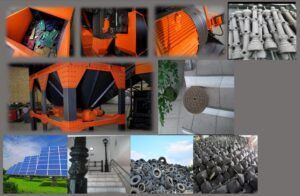Waste Processing for the Third Millennium
Creating a Safer, Cleaner, Healthier, Better Sustainable Future
Our proposed technology is fundamentally different from other waste processing systems currently used in the world.
The groundbreaking inventions we represent provide a solution to one of the biggest challenges of Humanity.
Our solutions process municipal, solid and hazardous waste, renewable and reusable energy without harmful emissions.
Sunshine Green Environmental Protection and OnEarth MissionX as part of The Poseidon Strategy Alliance provide a solution to this global issue with its partner technology.
The first technology processes hazardous electronic waste without burning or using acids during the process and creating reusable materials (gold, silver, copper, etc.)
The second technology processes municipal solid waste in a reactor, where everything stays in a closed cycle, while we create electricity, which can be sent to any network providing constant energy to large suppliers. It will be a key player in developing countries, island communities globally, solving two problems at a time.
The processing, and potentially recycling of solid waste has never been more important than in today’s world. Especially in Developing Countries, in Island Communities, where the circumstances most of the time do not support establishing professionally managed waste management systems.
Unfortunately, in many cases, the garbage ends in the ocean, not only solid household waste but also harmful and hazardous materials, industrial waste, used car tires, electronic scrap, chemicals.
The most important consideration during any processing is to avoid or eliminate emissions of harmful substances, which release toxic substances into the environment, water, land, and air.
Processing Electronic waste without burning or using acids with no emission
-
Button
Circuit boards, computer parts, batteries, cellphones will be processed, reused without burning or using harmful acids, only using environmentally conscious methods. No harmful emissions.
-
Button
Besides using special liquid (not acidic), a special physical process separates the different materials and selects, prepares them for reuse. Nothing goes to waste, nothing harmful out of the system. This method also processes used tires.
-
Button
Gold, Silver, Copper, Plastic parts. Zero-emission.
There are no harmful substances poisoning the environment.
Confidential details to be shared with qualified entities.
Waste - to - Energy
Waste-to-energy (WtE) or energy-from-waste (EfW) is the process of generating energy in the form of electricity and/or heat from the primary treatment of different kinds of waste.
Generally, these waste-to-energy processes include thermal conversions such as combustion (incineration), pyrolysis, gasification, or biological treatments such as anaerobic digestion and fermentation, etc., and various combinations of the above. Energy can be derived from waste in a number of ways.
The wrong, traditional way: waste-to-energy plants burn municipal solid waste (MSW), often called garbage or trash, to produce steam in a boiler that is used to generate electricity. MSW is a mixture of energy-rich materials such as paper, plastics, yard waste, and products made from wood. … The waste (fuel) is burned, releasing heat, and also, increases air pollution.
Incinerators generate harmful pollution posing a risk to human health in nearby communities. Burning trash releases dioxin, lead, and mercury (in many areas, incinerators are the largest sources of these pollutants),[26] greenhouse gas emissions including both biogenic sources and carbon dioxide,[27] and hazardous ash.
Waste to Energy is renewable energy or not?
While not as widely discussed as a renewable energy resource, waste to energy is considered renewable because with factors such as population growth and rising consumption levels, the constant and high volume of trash produce itself continuously without interruption. Therefore, there is potential for the waste to energy market to increase in the next few years.
Over 80 percent of thermal waste to energy plants are located in developed countries, led by Japan, France, Germany, and the United States.
Why our groundbreaking technology is considered the future’s best waste-to-energy method?
- Constant waste processing
- Constant stable electricity to the Country’s grid system
- Easy, flexibly installation, easy to mobilize
- Compact construction
- Sizeable can be produced in any size
- No harmful emissions
- Real deal to Developing Countries, Island Communities: the system provides jobs, develop infrastructures and economy
- 3-in-1 solution to the volume of the waste, solid waste and biological pollution to the environment and the ocean, constant energy (residential and industrial)
Confidential details to be shared with qualified entities.
OnEarth MissionX LLC
9040 Town Center Parkway Lakewood Ranch, FL 34202 USA
EMAIL US
CALL US
877-ENSYNOX (877-367-9669
Sunshine Green Environmental Services LLC








